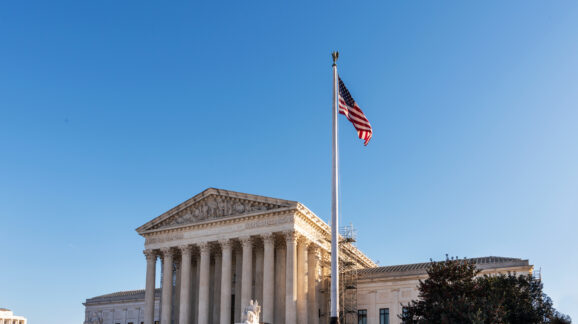Supreme Court Kept Universal Service Boondoggle on Life Support
The strident insistence that someone else will pay a tax has been a dominant theme of 2025. Last month, the US Supreme Court stuck to that script in Federal Communications Commission v. Consumers’ Research, ruling that the universal service provisions of the Telecommunications Act of 1996 weren’t an unconstitutional delegation of Congress’s taxing power.
Taxes can be complex, so it is hard to say who really pays, or how much. But Milton Friedman offered a simple maxim to help clarify those questions: “Keep your eye on one thing and one thing only: how much government is spending, because that’s the true tax.”
Universal service is an opaque tax-and-spend plan that provides subsidies for broadband and other communications services to those who might lack access. In 1996, well-meaning legislators directed the FCC to levy fees on some telecommunications carriers to support these subsidies. But consumers are the ones who have wound up paying, and we can see the line item on our phone bills.
Despite the Supreme Court’s ruling, and that some consumers and essential services may truly need help accessing broadband, the universal service mandate isn’t good policy. The subsidies aren’t targeted at those who really need them, and neither voters nor Congress can easily hold the FCC accountable for misspending.
Far too much is wasted on overly expensive systems or outright fraud. The best policy would be to eliminate these subsidies entirely—or at least make targeted subsidies subject to Congress’s appropriations process. But some policymakers are mired in the rhetoric that sold the boondoggle at the start.
A few lawmakers want to direct even more money to universal service. One such bill, S. 1651, would make “edge providers”—entities such as search engines, social media platforms, app stores, e-commerce platforms, and video gaming services that provide goods and services online—pay.
The Lowering Broadband Costs for Consumers Act of 2025 ought to be called the Raising Communications Costs for Taxpayers Act. In the end, we would all pay. But the tax would be better hidden—and not always a line item on a bill.
We would wind up with less free content, higher app prices, and a less resilient tech sector.
The real-world results of universal service no longer fit the sales pitch. Billions of dollars are wasted in unnecessary spending. The funding mechanism is unfair. For example, some universal service subsidies go to carriers who serve remote areas. These subsidies are partly funded by lower-income urban cell-phone customers, who pay more for their service to benefit wealthy ranchers and rural landlords.
The Congressional Research Service recently noted that too many subsidized rural broadband providers never provide the service they promised. Another bill, H.R. 2399, calls for the FCC to improve the vetting process for companies that apply. But the FCC would still be spending other people’s money and has no reason (or ability) to get the vetting right.
If the agency had incentives to avoid waste, it would have slowed the flow of funds to expensive-to-build wireline systems years ago and focused on services such as satellite broadband that can serve remote rural areas at comparatively low cost.
Another share of universal service subsidies goes to schools, libraries, and rural health-care providers. While these may be worthy recipients, consultants coach schools and health care facilities to maximize their take of subsidies, skimming fees off the top.
And, in the case of schools, the purported benefits are in question. Technology is deployed to schools, but there is no evidence that this has any educational benefit.
Despite the FCC’s fraud-prevention initiatives, which took decades to put in place, fraud continues. The 1996 Act included no meaningful accountability measures.
Legislators and the public alike are reduced to ad hoc pleas to the FCC to stop wasting money. These include H.J.Res. 33, a joint resolution appealing to the FCC to ensure that subsidies for Wi-Fi off school premises are used for educational purposes.
The Telecommunications Act never authorized this spending in the first place. The resolution is a welcome effort to redirect the FCC, but such efforts have been few and far between.
Read the full article at Bloomberg Law.
